Unit 3 Planning a trip PA 课件
文档属性
| 名称 | Unit 3 Planning a trip PA 课件 |
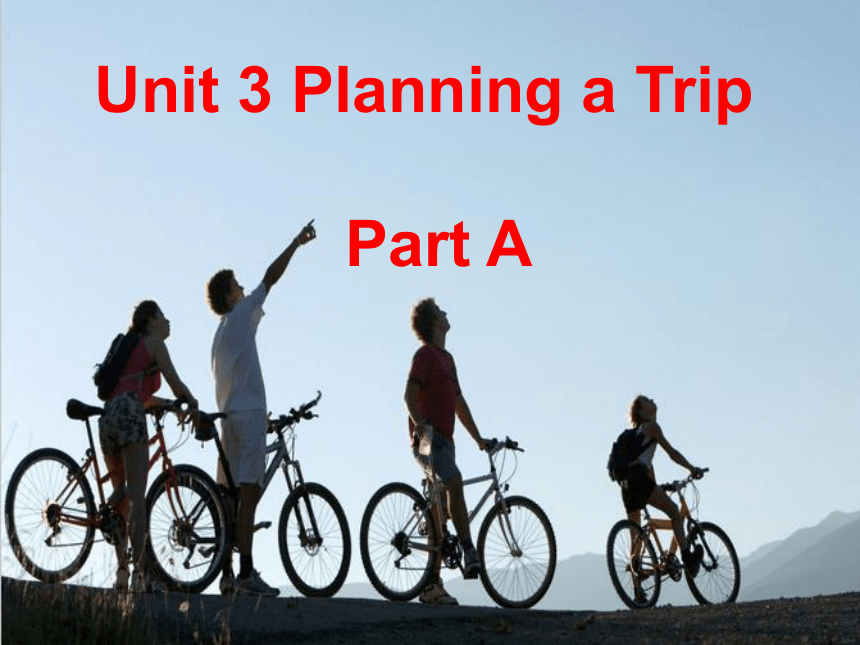
|
|
| 格式 | zip | ||
| 文件大小 | 3.5MB | ||
| 资源类型 | 教案 | ||
| 版本资源 | 闽教版(三年级起点) | ||
| 科目 | 英语 | ||
| 更新时间 | 2016-10-21 20:54:58 | ||
图片预览


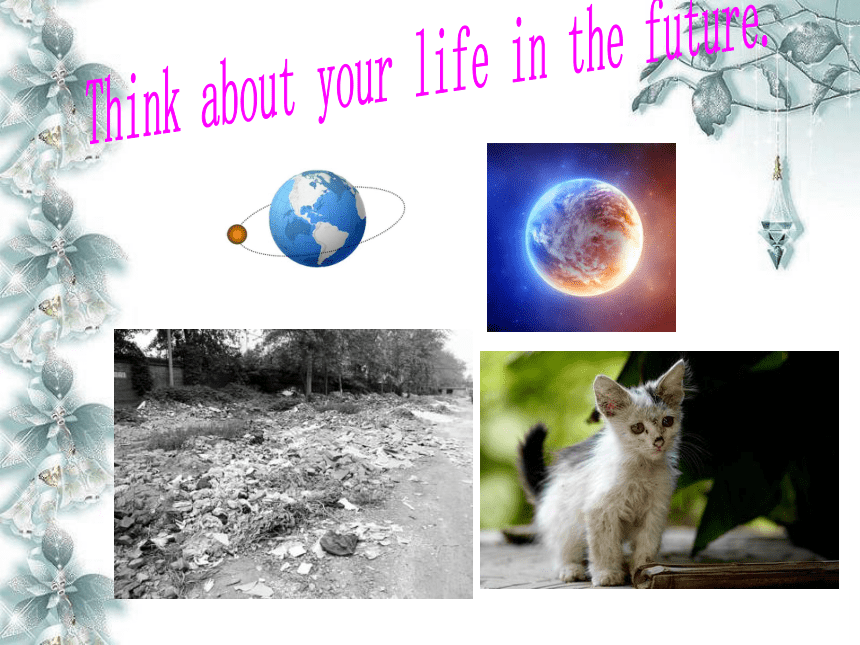

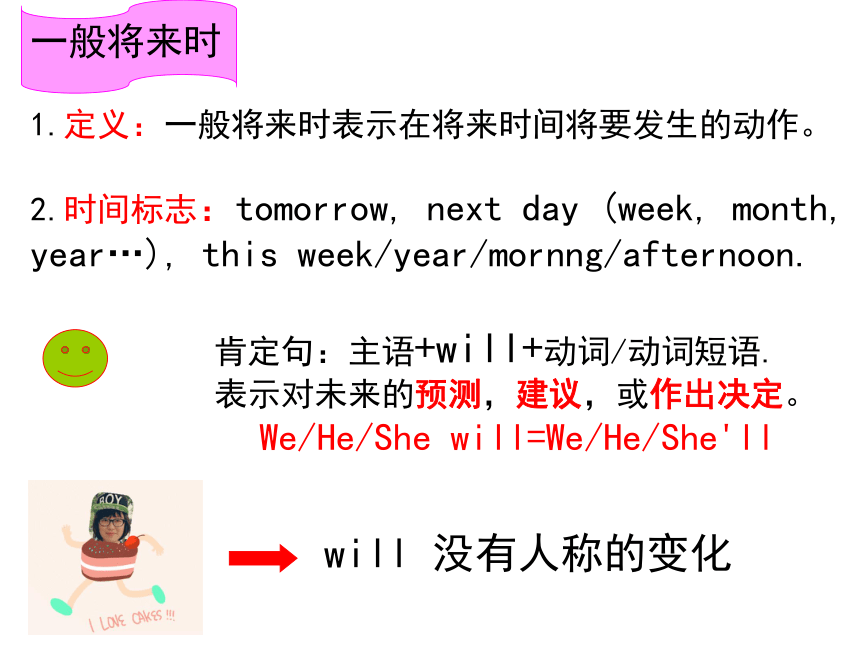
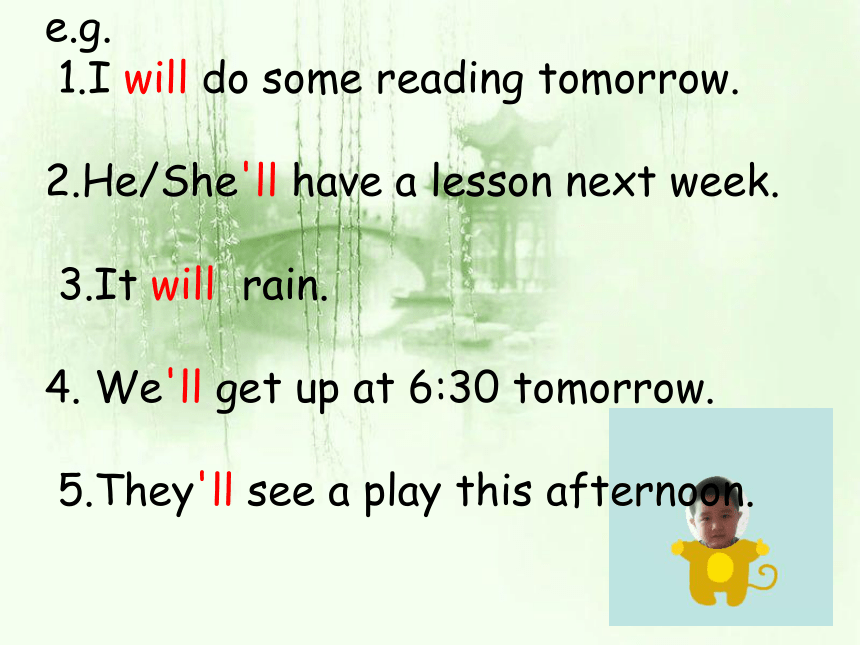
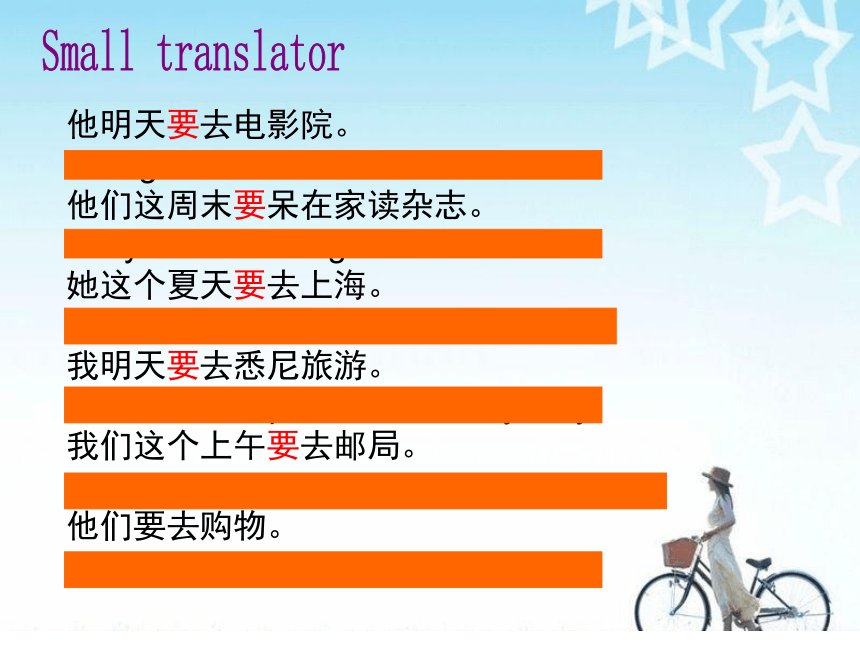
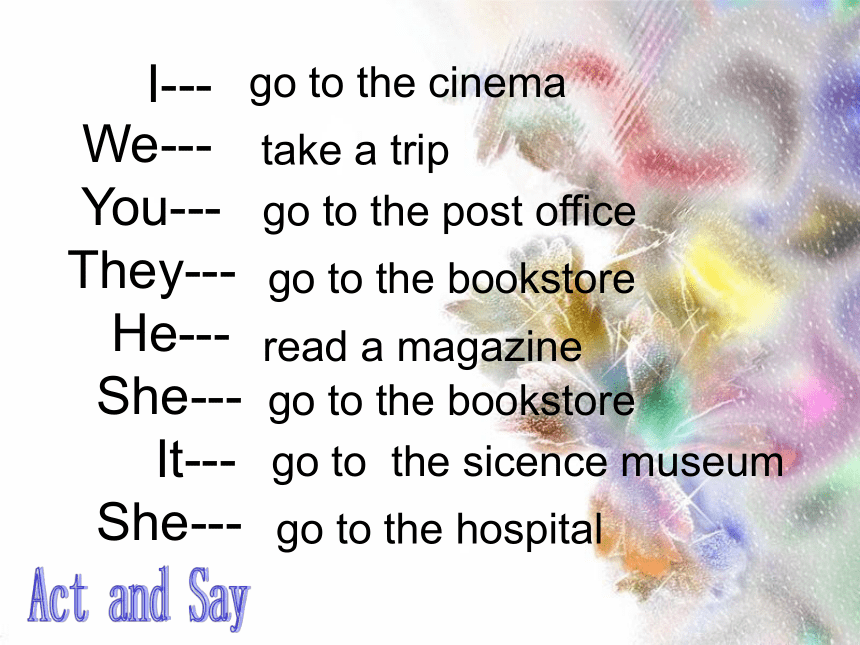
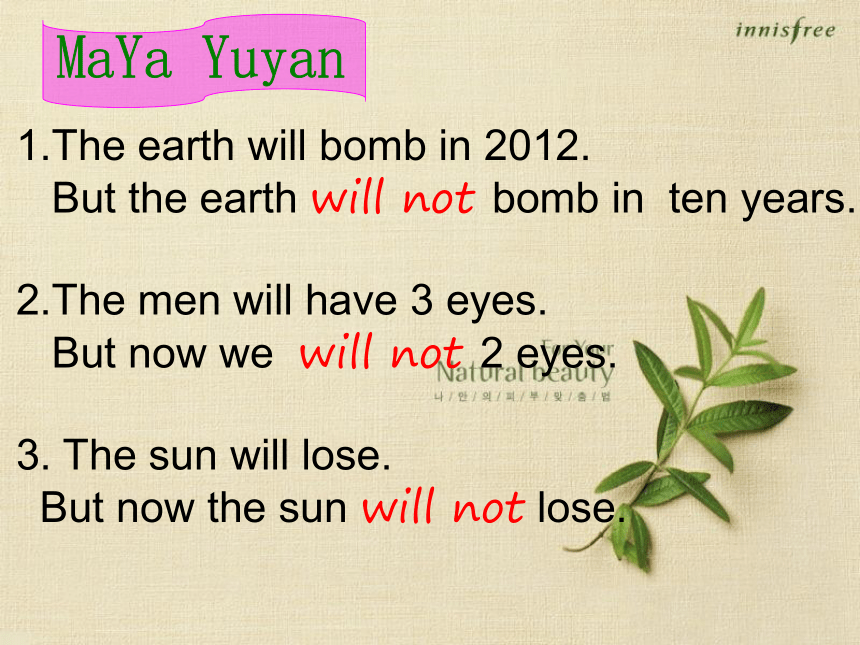
文档简介
课件22张PPT。Unit 3 Planning a Trip
Part Alet's sing a song!Think about your life in the future.I think we will live on the moon.
Abdul, 11 years old.
I don't think we will have teachers!
Rosa, 12 years old.
We will not travel by car.
We will travel by spaceship .
Jim, 11 years old.
will 没有人称的变化一般将来时
1.定义:一般将来时表示在将来时间将要发生的动作。
2.时间标志:tomorrow, next day (week, month, year…), this week/year/mornng/afternoon.
肯定句:主语+will+动词/动词短语.
表示对未来的预测,建议,或作出决定。
We/He/She will=We/He/She'll
e.g.
1.I will do some reading tomorrow.
2.He/She'll have a lesson next week.
3.It will rain.
4. We'll get up at 6:30 tomorrow.
5.They'll see a play this afternoon.
他明天要去电影院。
He'll go to the cinema tomorrow.
他们这周末要呆在家读杂志。
They will read magazines at home.
她这个夏天要去上海。
She'll go to Shanghai this summer.
我明天要去悉尼旅游。
I will take a trip tomorrow in Sydney.
我们这个上午要去邮局。
We'll go to the post office this morning.
他们要去购物。
They'll go shopping.Small translator I---
We---
You---
They---
He---
She---
It---
She---go to the cinema take a tripgo to the post office go to the bookstoreread a magazinego to the hospital go to the bookstore go to the sicence museumAct and SayMaYa Yuyan1.The earth will bomb in 2012.
But the earth will not bomb in ten years.
2.The men will have 3 eyes.
But now we will not 2 eyes.
3. The sun will lose.
But now the sun will not lose.一般将来时
否定句:主语+will not+动词/动词短语.
will not= won't
will 没有人称的变化
e.g.
1.I will not do any reading tomorrow.
2.He/She won't have a lesson next week.
3.It'll not rain.
4. We won't get up at 6:30 tomorrow.
口诀:一般将来也浮云,句型结构是神马.
主语,will和动词, 否定will加not.
一般将来时
一般疑问句:will+主语+动词/动词短语?
will 没有人称的变化 口诀:一般将来也浮云,句型结构是神马.
主语,will和动词,否定will加not.
一般疑问will在前,I/we 变you加问号。e.g.
1.I will do some reading tomorrow.
Will you do any reading tomorrow?
Yes, I will.
2.He/She will have a lesson next week.
Will she have a lesson next week?
Yes, she will.
3. We'll get up at 6:30 tomorrow.
Will you get up at 6:30 tomorrow?
Yes, we will.
Chain-reactionI will take a trip in ShangHai.
She'll go to Beijing next week.
We will watch a film tomorrow.
He'll read a magazine this moring.
They'll run next month.
PK-changingT: Are you tired?
S: Yes.
T: OK,shall I have a rest?
Shall I have some water?
Shall I drink some juice?
A chant for you!
一般将来时
be going to与will的区分
be going to 1.已经计划好要做某事
2.确定会发生的事.
will 1. 临时决定要做某事。
2. 对未来的预测。
常用 I think+主语+will +动词。
I think it will rain tomorrow .
I think they will walk here.
I think there will be lots of people here.
Make a sentenceSummary:will 没有人称的变化一般将来时
1.定义:一般将来时表示在将来时间将要发生的动作。
2.时间标志:tomorrow, next day (week, month, year…), this week/year/mornng/afternoon.
肯定句:主语+will+动词/动词短语.
表示对未来的预测,建议,或作出决定。
We/He/She will=We/He/She'll
Thank you!
Part Alet's sing a song!Think about your life in the future.I think we will live on the moon.
Abdul, 11 years old.
I don't think we will have teachers!
Rosa, 12 years old.
We will not travel by car.
We will travel by spaceship .
Jim, 11 years old.
will 没有人称的变化一般将来时
1.定义:一般将来时表示在将来时间将要发生的动作。
2.时间标志:tomorrow, next day (week, month, year…), this week/year/mornng/afternoon.
肯定句:主语+will+动词/动词短语.
表示对未来的预测,建议,或作出决定。
We/He/She will=We/He/She'll
e.g.
1.I will do some reading tomorrow.
2.He/She'll have a lesson next week.
3.It will rain.
4. We'll get up at 6:30 tomorrow.
5.They'll see a play this afternoon.
他明天要去电影院。
He'll go to the cinema tomorrow.
他们这周末要呆在家读杂志。
They will read magazines at home.
她这个夏天要去上海。
She'll go to Shanghai this summer.
我明天要去悉尼旅游。
I will take a trip tomorrow in Sydney.
我们这个上午要去邮局。
We'll go to the post office this morning.
他们要去购物。
They'll go shopping.Small translator I---
We---
You---
They---
He---
She---
It---
She---go to the cinema take a tripgo to the post office go to the bookstoreread a magazinego to the hospital go to the bookstore go to the sicence museumAct and SayMaYa Yuyan1.The earth will bomb in 2012.
But the earth will not bomb in ten years.
2.The men will have 3 eyes.
But now we will not 2 eyes.
3. The sun will lose.
But now the sun will not lose.一般将来时
否定句:主语+will not+动词/动词短语.
will not= won't
will 没有人称的变化
e.g.
1.I will not do any reading tomorrow.
2.He/She won't have a lesson next week.
3.It'll not rain.
4. We won't get up at 6:30 tomorrow.
口诀:一般将来也浮云,句型结构是神马.
主语,will和动词, 否定will加not.
一般将来时
一般疑问句:will+主语+动词/动词短语?
will 没有人称的变化 口诀:一般将来也浮云,句型结构是神马.
主语,will和动词,否定will加not.
一般疑问will在前,I/we 变you加问号。e.g.
1.I will do some reading tomorrow.
Will you do any reading tomorrow?
Yes, I will.
2.He/She will have a lesson next week.
Will she have a lesson next week?
Yes, she will.
3. We'll get up at 6:30 tomorrow.
Will you get up at 6:30 tomorrow?
Yes, we will.
Chain-reactionI will take a trip in ShangHai.
She'll go to Beijing next week.
We will watch a film tomorrow.
He'll read a magazine this moring.
They'll run next month.
PK-changingT: Are you tired?
S: Yes.
T: OK,shall I have a rest?
Shall I have some water?
Shall I drink some juice?
A chant for you!
一般将来时
be going to与will的区分
be going to 1.已经计划好要做某事
2.确定会发生的事.
will 1. 临时决定要做某事。
2. 对未来的预测。
常用 I think+主语+will +动词。
I think it will rain tomorrow .
I think they will walk here.
I think there will be lots of people here.
Make a sentenceSummary:will 没有人称的变化一般将来时
1.定义:一般将来时表示在将来时间将要发生的动作。
2.时间标志:tomorrow, next day (week, month, year…), this week/year/mornng/afternoon.
肯定句:主语+will+动词/动词短语.
表示对未来的预测,建议,或作出决定。
We/He/She will=We/He/She'll
Thank you!
同课章节目录
- Unit 1 Meeting New Friends
- Part A
- Part B
- Part C
- Unit 2 Teachers’ Day
- Part A
- Part B
- Part C
- Unit 3 Planning a Trip
- Part A
- Part B
- Part C
- Unit 4 Weekend Activities
- Part A
- Part B
- Part C
- Review 1
- Unit 5 Months of the Yea
- Part A
- Part B
- Part C
- Unit 6 Asking the Way
- Part A
- Part B
- Part C
- Unit 7 Making phone Calls
- Part A
- Part B
- Part C
- Unit 8 My Friends
- Part A
- Part B
- Part C
- Review 2
